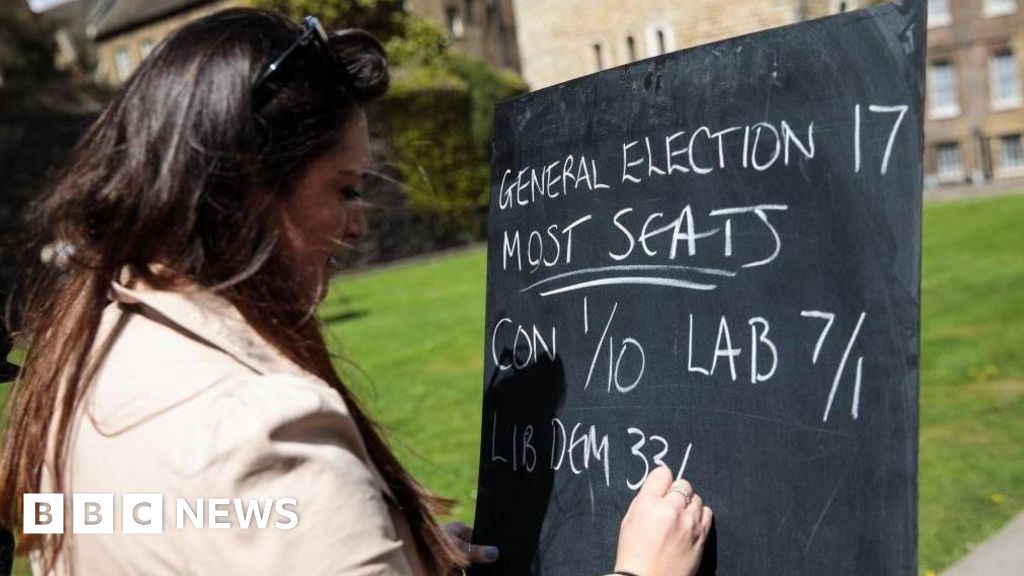Image source, Getty Images
An investigation into Rishi Sunak’s parliamentary aide Craig Williams placing a £100 “flutter” on the general election has thrown a spotlight on the world of political betting.
Gambling on sporting events is now very big business in the UK. Millions will be wagered this summer on the Euros and the Paris Olympics, most of it online rather than the traditional way of entering a bookmaker’s.
But betting has long been part of the political world too.
From the outside, betting on an obscure by-election or a party leadership contest may seem strange – but for some political obsessives it combines the unpredictability and excitement of sport with the intrigue of a dramatic narrative.
“I got the Lib Dems to win at 20-to-1, and I got it right,” he said.
Mr Smithson, who runs the politicalbetting.com website after years as a BBC political journalist, said: “I love politics and there’s nothing like predicting winner and losers.
“People love to look at things and think they know the answer – when you go for a drink in the pub people always end up saying ‘I think it’s going this way, or that'”.
Political betting is often used by betting companies as a gateway to entice new punters to more lucrative – for the firms – betting platforms.
“Most bookies get into political betting because they like signing up new customers who will then be attracted in other areas,” said Mr Smithson.
But some remarkable amounts of money have been wagered over the years.
In 2017, an anonymous student placed a series of wagers amounting to £10,000 on Jeremy Corbyn’s Labour winning the general election. They lost their money.
Mike Smithson estimates “between £10m and £20m will be bet on the election this year”.
Online betting exchange Betfair suggests more than £8m has been staked on the outcome of the general election. But these figures do not include bets with the larger betting firms.
But according to William Kedjanyi, head of political content at Star Sports, political betting has been “growing steadily over the last ten years”.
“It has been helped by the fact we’ve had particularly volatile events – the ‘yes’ and ‘no’ Brexit referendum was perfect for betting.
“People like to vote on very tight events.”
Over the years, the types of political bets have diversified.
Traditional bets on election outcomes remain popular, but novelty bets, such as predicting specific political events or decisions, are gaining traction.
“Elections by themselves are perfect betting events – there are lots of options across the 650 constituencies, betting on each one or overall victory,” says Mr Kedjanyi.
Betting on politics has a surprisingly long history in the UK.
Charles James Fox, the 18th-century Whig prime minister, was known to bet “frequently, largely, and judiciously, on the social and political occurrences of the time” according to his biographer.
During the Victorian and Edwardian periods, gambling laws became stricter, impacting political betting.
But in 1963 Ladbrokes began openly accepting bets on political events and by the following year’s general election, William Hill had joined in.
But people who work at Westminster – like those who work at horse racing stables or football clubs – need to be careful.
Using confidential information to gain an advantage could amount to cheating under the Gambling Act – which is a criminal offence.
The Gambling Commission is making inquires into Craig Williams, a Conservative Party election candidate and former aide to Rishi Sunak, amid claims he placed a £100 bet on the date of the election days before the PM announced it.
Mr Williams has apologised and said he made a “huge error of judgement” but has not confirmed the details of his bet.
Mr Sunak has described his actions as “very disappointing” and the opposition parties are calling for him to be suspended as a candidate or face a Cabinet Office investigation.
It is understood the watchdog wrote to all licensed bookmakers this week requesting information on anyone who stood to gain more than £199 by betting on a July election in the UK.
Westminster’s gamblers will be watching the results of this one with particular interest.

